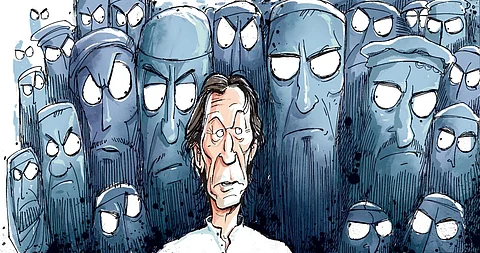

Is it not an old and proven adage that the proof of the pudding is in the eating? And none could be more imperiled than the new PM of Pakistan, Imran Khan, if he were to challenge the veracity of it.
Imran had entered politics with the slogan of being a crusader against Pakistan’s well-heeled ancient regime that thrived for decades because of a powerful fusion of feudal and clerical interests. The ‘old Pakistan’ that Imran committed himself to change had seen the feudals amassing enormous wealth while their clerical cohorts presided over the rampant rise of religious extremism in the country.
Imran’s mantra of a radical change (Tabdeeli) in the face and outlook of governance in Pakistan was the catalyst that paved his ascent to power in July’s general elections. His election victory was evidence that his message to ring in a new Pakistan had resonated with the majority of people. Their part done, the people expected and wanted him to deliver. They desired him to prove that his money was where his mouth had been; they wanted proof of the pudding.
But to the horror of his legions of followers and aficionados, Imran seems to have flunked the very first test he was put to. In his agenda of governance, Imran had rightly put Pakistan’s wobbling economy as his top priority. Imran quickly put together an Economic Advisory Council (EAC) to get suggestions to cure an ailing economy and picked some of the most eminent Pakistani economists to sit on it. The team of 18 advisors included three brilliant young economists teaching at top universities in the UK and US.
However, the ink hadn’t literally dried on the unveiling of these brilliant minds when Pakistan’s ‘bearded brigade’ of obscurantist clerics pounced like hawks on the name of one economist: Dr Atif Mian, from the world-renowned Princeton University in the US. The mullahs cried foul because Mian belonged to the minority Ahmadiya or Qadiyani sect, which has been in the crosshairs of the politically powerful and influential clerics.
The Ahmadiyas were considered a ‘deviant’ sect among Muslims of Pakistan until they were excommunicated and declared ‘non-Muslims’ by an act of parliament and an amendment was made to Pakistan’s constitution in 1974. This was done at the behest of clerics who had the better of the self-proclaimed socialist Zulfiqar Ali Bhutto, the then PM of Pakistan. The Ahmadiyas have since been prey to the religious extremists emboldened by their success in arm-twisting politicians. The caving of a supposedly areligious Bhutto was a feather in their cap. They have never, since, relented in their ruthless persecution of the Ahmadiyas, whose mosques have been routinely torched in Pakistan. Ahmadiyas are even forbidden to call their devotees to places of worship.
With his acclaimed reputation of being a dogged fighter, Imran wasn’t supposed to be blackmailed by the bearded brigade. Initially he held his ground. In response to the holler from the obscurantists, his spokesman boldly asserted that the PM wasn’t going to be dictated by anyone. Inexplicably, however, Imran caved in within days and hastily withdrew the name of Dr Mian from his team of advisors. Flummoxed by his weakness and pusillanimity in the face of the clerical backlash, the other two West-based economists also bowed out voluntarily.
The grisly episode may have delighted Imran’s detractors and political rivals to point the finger at his political naivete. However, to Imran’s loyalists and doting followers, their hero’s capitulation to religious obscurantists and hawks is a shattering blow. It’s not only that Imran has shot himself in the foot, as far as his agenda of reforms is concerned. He had set out to find a long-term cure for Pakistan’s haemorrhaging economy with the help of talented people, both at home and abroad, but has lost whatever clout he had with Pakistani academics and experts abroad because of this horrifying example of cowardliness.
The most disappointed are those young Pakistanis who had latched on to his slogan of a ‘New Pakistan’ harking back to its founding father M A Jinnah’s dream of a Pakistan free of any -ism. Jinnah had unequivocally articulated his vision of a future Pakistan in his address of 11 August 1947 - three days before the birth of the nation. The centrepiece - Jinnah’s Pakistan was a country where there would be no room for religious identity of its citizens. He envisioned a Pakistan of equal rights for all its citizens without any regard for religious creed, race or linguistic affiliation.
The young Pakistanis have seen their country going to the dogs because of the corrosive power of clerics and their unholy alliance with robber barons masquerading as ‘leaders’. Imran’s young aficionados expected him to be different. Impressed by his exploits in cricket, they expected him to turn the tables on the feudal-cleric axis.
They hoped he would call the clerical bluff and cut the bearded brigade to size. It couldn’t be anything but traumatic for them to see their ‘hero’ wilting under the pressure of clerics.
Equally disappointed are the overseas Pakistanis, whose ranks are teeming with adoring fans of Imran. He may rue disappointing them as his government is counting a great deal on their financial support to another of his slogans: building badly needed dams to harness Pakistan’s dwindling water resources and stave off drought in vast tracts of its land.
Overseas Pakistanis have responded enthusiastically to Imran’s call to save Pakistan from turning into a parched country. But his failure to stand up to the religious bullies may force them to revisit their enthusiasm. That would be tragic for him and Pakistan.
Karamatullah K Ghori
Former Pakistani diplomat
Email: K_K_ghori@hotmail.com